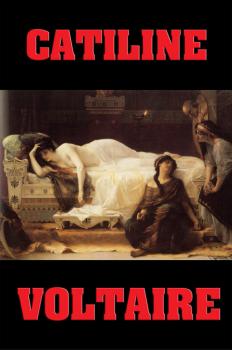Voltaire
Список книг автора VoltaireLetters on England
Voltaire (1694-1778) was a noted French playwright, poet, short story writer and most importantly, political satirist, who is remembered as one of the foremost philosophers of the Age of Enlightenment. Voltaire believed in personal freedom and a person's duty to use reason in challenging social and political abuses, as well as religious intolerance. In 1725, following a brief bout in prison, Voltaire departed for England where he spent the next three years in the company of intellectuals like Alexander Pope and Jonathan Swift. After his return to France, Voltaire set out to write «Lettres Philosophiques», or «Letters on England», in which he challenged the old regime of France with brief, epigrammatic essays on the political liberty, religious tolerance and commercial enterprise of the British. The work – which was soon condemned by the French censor and all copies ordered to be seized – praises the English political and trade systems, the peaceful interaction between Quakers, Anglicans, Presbyterians and other religious orders, and the works of British icons like Francis Bacon, John Locke, Isaac Newton and William Shakespeare.
Candide
"Candide" is the famous satire and best-known work by Voltaire. First published in 1759, «Candide» is the story of its central character who travels throughout Europe and South America experiencing and witnessing much misfortune on the way. It is within the clever construct of this narrative that Voltaire refutes the philosophy of Gottfried Wilhelm Leibniz, whose central idea was that life was the best of all possible worlds and that disasters, should they occur, were harbingers of better things to come. Voltaire found this philosophy insultingly ridiculous and within the humorous and satirical construct of this work he effectively exposes the idiocy of a philosophy that was so pervasive in his time.
Candide and Other Stories
Collected together here in “Candide and Other Stories” we have a collection of philosophical fiction by 18th century French author Voltaire. In the author’s best known work, “Candide”, we find the story of a man who has lived a sheltered comfortable life, but when he begins to travel the world he witnesses the pervasive hardships of the world, an experience that leads to his ultimate disillusionment with his previously held philosophy. In “Micromegas”, Voltaire crafts an early work of science fiction in which a 450 year old, 120,000 foot tall alien travels the universe ultimately discovering humans and their philosophies on earth. In the third work of this volume we have the story of its titular character, Zadig, an ancient Babylonian philosopher. Fourthly in a work of narrative verse, “What Pleases the Ladies” is the tale of Jean Robert who seeks an answer to the question, “what do women desire?” The fifth story of this collection, “The Huron”, is a tale of a native American who travels across the Atlantic to discover a very different world than his own in Brittany, France. Lastly we find “The White Bull”, a philosophical fable based on the Greek tale of Europa and the bull. This collection follows the translations of William F. Fleming.
Candide (Illustrated by Adrien Moreau with Introductions by Philip Littell and J. M. Wheeler)
“Candide” is Voltaire’s most famous work, a satirical masterpiece, which was first published in 1759. It is the story of its central character, the titular Candide, who lives a sheltered comfortable life and has been indoctrinated into the philosophy of Leibnizian optimism, by his mentor, Professor Pangloss. When Candide travels throughout the world he begins to witness the pervasive hardships of life, an experience that leads to his ultimate disillusionment with Leibnizian philosophy. Through this clever narrative Voltaire refutes the philosophy of Gottfried Wilhelm Leibniz, whose central idea was that despite the apparent imperfections of the world, it was the best of all possible worlds because it was created by an all powerful and all knowing God. Voltaire found this philosophy insultingly ridiculous and within the humorous and satirical construct of this work he effectively exposes the idiocy of a philosophy that was so pervasive in his time. “Candide” is a fast-moving and fantastical tale which established Voltaire as not only one of the most important but controversial authors of his time. This edition is illustrated by Adrien Moreau and includes introductions by Philip Littell and J. M. Wheeler.
Philosophical Dictionary
A masterpiece of Enlightenment-era literature, this collection of brief, incisive essays constitutes a thought-provoking analysis of eighteenth-century social and religious conventions. Voltaire intended to entertain as well as to enlighten, and his sardonic wit lends a strikingly modern feeling to these writings.One of France's most celebrated citizens, Voltaire (1694-1778) is best known for his satirical novel Candide. His political treatises, which frequently put him at odds with the church and state, have exercised enormous influence on political theorists, philosophers, educators, and historians. This compilation, first published in 1764, covers a broad range of topics. Organized alphabetically, its subjects range from adultery, atheism, bankruptcy, and common sense to religion, superstition, tolerance, and virtue.
Candide
Evergreen in its appeal, <I>Candide</I> makes us laugh at human folly and marvel at our reluctance to face reality and the truth. Voltaire's brilliant satire, first published in Paris in 1759, is relentless and unsparing. Virtue and vice, religion and romance, philosophy and science — all are fair game. <BR>Through the adventures of young Candide, his love Cunégonde, and his mentor Dr. Pangloss, we experience life's most crushing misfortunes. And we see the redeeming wisdom those misfortunes can bring — all the while enjoying Voltaire's witty burlesque of human excess. <BR>In this unique volume, readers who wish to follow every nuance of Voltaire's classic tale in the original French can do so with the aid of a new and exacting English translation on facing pages. Shane Weller's critical introduction illuminates the satire of <I>Candide</I> and the reasons for its enduring appeal.
Candide and Other Stories
"Candide" is the famous satire and best-known work by Voltaire. First published in 1759, «Candide» is the story of its central character who travels throughout Europe and South America experiencing and witnessing much misfortune on the way. It is within the clever construct of this narrative that Voltaire refutes the philosophy of Gottfried Wilhelm Leibniz, whose central idea was that life was the best of all possible worlds and that disasters, should they occur, were harbingers of better things to come. Voltaire found this philosophy insultingly ridiculous and within the humorous and satirical construct of this work he effectively exposes the idiocy of a philosophy that was so pervasive in his time. Also included in this volume are the additional short stories 'Micromegas', 'Zadig', 'The Huron (The Ingenu)', 'The White Bull', and the poem 'What Pleases the Ladies'.
Catiline
François-Marie Arouet wrote under the nom de plume of Voltaire, and produced works in almost every literary form, including plays, poems, novels, essays, and historical and scientific works. In his preface to this play Voltaire says: «The learned will not here meet with a faithful narrative of Catiline's conspiracy: a tragedy, they very well know, is not a history, but they will see a true picture of the manners of those times: all that Cicero, Catiline, Cato and Cæsar do in this piece is not true, but their genius and character are faithfully represented: if we do not there discover the eloquence of Cicero, we shall at least find displayed all that courage and virtue which he showed in the hour of danger. In Catiline is described that contrast of fierceness and dissimulation which formed his real character; Cæsar is represented as growing into power, factious, and brave; that Cæsar who was born at once to be the glory and the scourge of Rome.»
Candide: A Play in Five Acts
Voltaire's classic novel CANDIDE has been adapted many times through many different forms of media, but this 20th-century dramatic version is one of the best. Voltaire's story endures because the character of Candide is capable of being moved to any time or place, and still be understood–and enjoyed–by a brand new audience. In an irrational world where only diehard optimists like Dr. Pangloss can believe that everything is for the best, Voltaire's dissection of human follies rings true, even today. In the end, his best advice to the individual trying to cope with the joys and sorrows of everyday life is just to…"Cultivate your garden!"
The Two Wine Casks
In THE TWO WINE CASKS, a spurned priest of Bacchus switches the wine cups at a wedding to avenge himself on the woman he loves, who's marrying another. The enchanted vintage makes her hate her husband-to-be. Three great dramas of jealousy and its corrosive effects on the relations between men and women.









